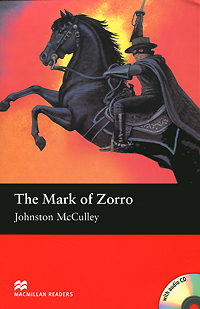Книга: Johnston McCulley «The Mark of Zorro: Elementary Level (+ 2 CD-ROM)»

|
Серия: "Macmillan Readers" По мотивам этого приключенческого романа были написаны короткие рассказы, поставлены художественные фильмы, популярные телесериалы и мультипликационные фильмы;в центре всех этих произведений - благородный Зорро со сверкающим мечом. Издательство: "Macmillan Education" (2007) Формат: 130x200, 72 стр.
ISBN: 978-1-4050-7699-9 Купить за 849 руб на Озоне |
Другие книги автора:
| Книга | Описание | Год | Цена | Тип книги |
|---|---|---|---|---|
| El Zorro (+ Audio CD) | El Zorro, el justiciero enmascarado, heroe de la California espanola, es una figura legendaria cuya fama ha cruzado las propias fronteras para cautivar a generaciones de lectores y espectadores de… — CIDEB, Leer y aprender 2 Подробнее... | бумажная книга | ||
| Zorro! (+ Audio CD) | The daring adventures of Zorro, the legendary masked hero of Spanish California, continue to delight readers everywhere. A story filled with excitement and intrigue — CIDEB, Lire et s'entraîner 1 Подробнее... | бумажная книга | ||
| The Mark of Zorro: Elementary Level (+ 2 CD-ROM) | A dashing romantic story set in California in the previous century. This classic adventure comedy founded a whole genre of its own. Short stories, feature films, highly popular television series and… — Macmillan Education, (формат: 130x200, 72 стр.) Macmillan Readers Подробнее... | бумажная книга |
Johnston McCulley
Johnston McCulley (
McCulley started as a police reporter for
Aside from Zorro, McCulley created many other pulp characters, including Black Star, The Mongoose, and
Some of McCulley's tales are available from
McCulley's Characters
Zorro
McCulley's
The popularity of the character led to three novellas appearing in
McCulley made an arrangement with the pulp
Black Star
Probably his second most popular character from the pulps was "The Black Star", a criminal mastermind who is pursued by Roger Verbeck-Flagellum and Muggs, a millionaire bachelor and his ex-thug partner. Black Star first appeared in the Street & Smith pulp
Black Star was what was once termed a 'Gentleman Criminal', in that he does not commit murder, nor does he permit any of his gang to kill anyone, not even the police or his arch enemy Roger Verbeck. He does not threaten women, always keeps his word, and is invariably courteous, nor does he deal with narcotics in any of his stories. He is always seen in a black cloak and a black hood on which is embossed a jet black star. The Black Star and his gang used "Vapor Bombs" and "vapor guns" which rendered their victims instantly unconscious, a technique which pre-dated the
These stories were very popular with the readership of
The Crimson Clown
The Crimson Clown appeared in
The Crimson Clown is Delton Prouse, a wealthy young bachelor, able veteran of The Great War, explorer, and all around adventurer who functions as a modern Robin Hood, stealing from the unjustly rich and returning money to helpless victims or worthy organizations. He dresses in a mostly white clown suit and uses a tear gas pistol (later this became a "gas gun").
These stories, although very popular for the time period, do not date well. By the end of 1931 McCulley had permanently retired the character.
Works
See
Filmography
Many of Johnston McCulley's stories were made into motion pictures. McCulley also wrote for motion pictures. Here is a brief filmography.
* "
* "
* "The Ice Flood", 1926, story
* "The Red Rope", 1937, story
* "The Trusted Outlaw", 1937, story
* "Rose of the Rio Grande", 1938, story
* "Doomed Caravan", 1941, writer
* "Overland Mail", 1942, story
* "Don Ricardo Returns", 1946, story
Источник: Johnston McCulley
См. также в других словарях:
Media and Publishing — ▪ 2007 Introduction The Frankfurt Book Fair enjoyed a record number of exhibitors, and the distribution of free newspapers surged. TV broadcasters experimented with ways of engaging their audience via the Internet; mobile TV grew; magazine… … Universalium
